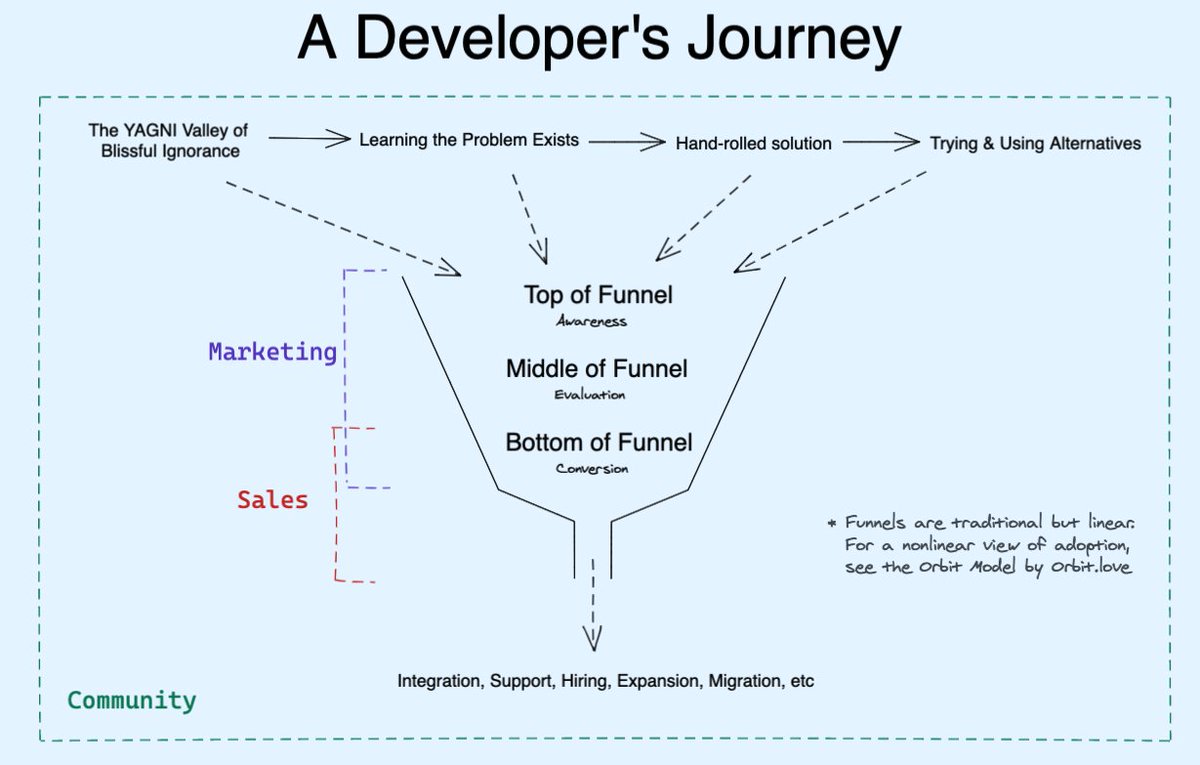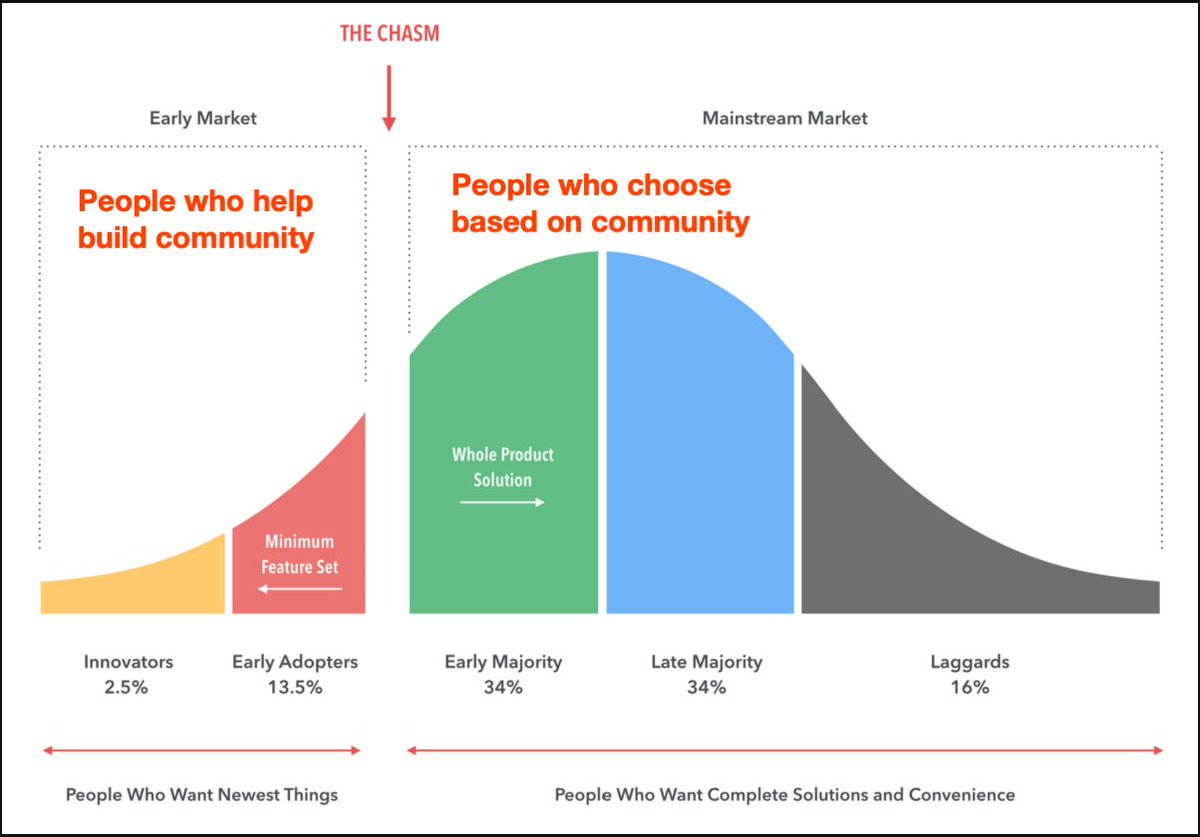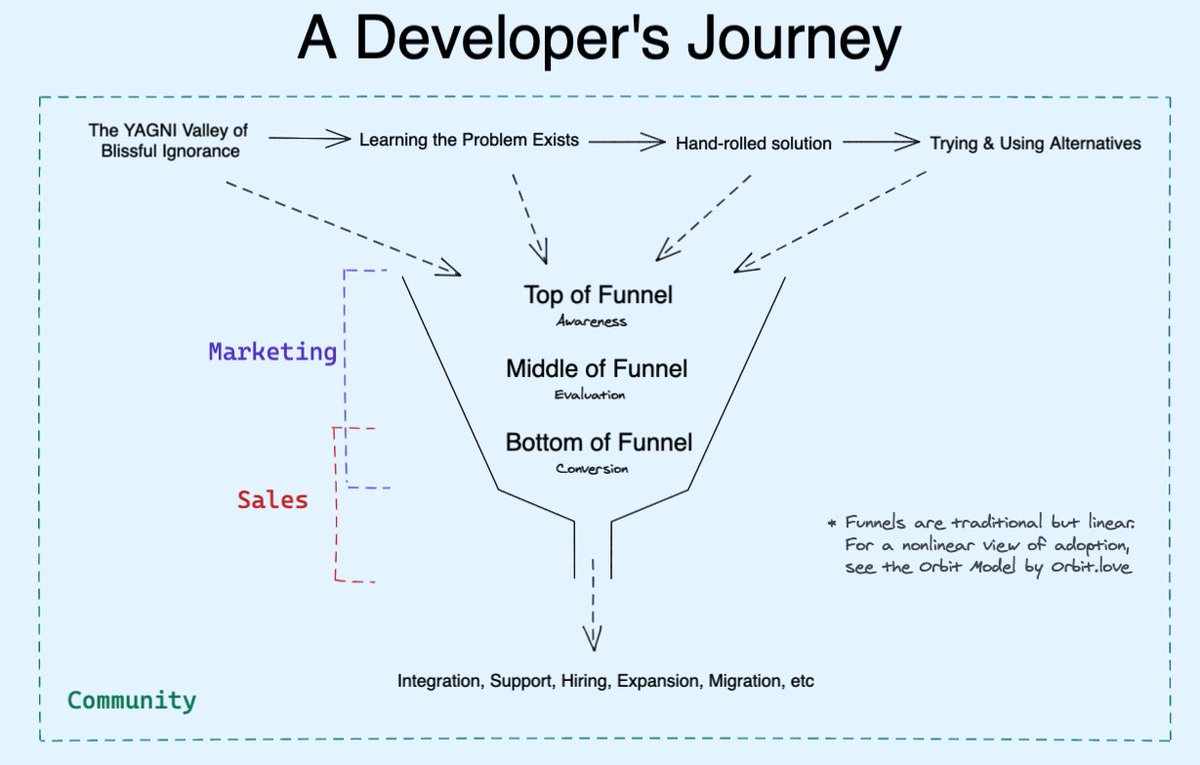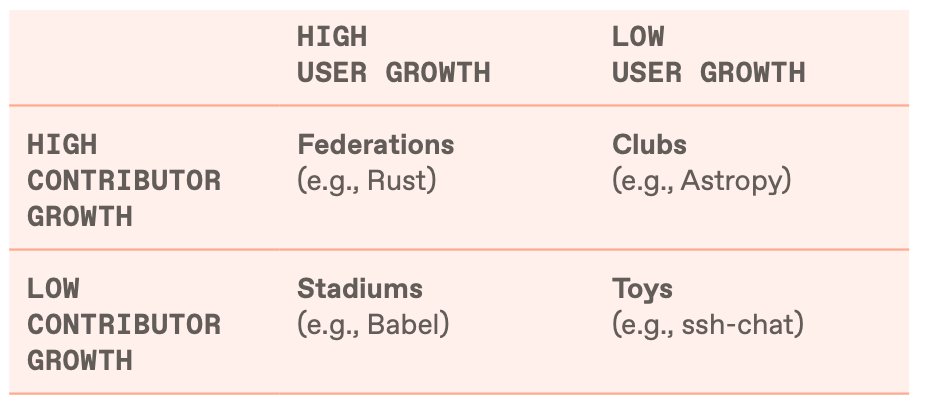
In the past week alone, I've had multiple chats with startups looking for developers who can build community.
I think this is a generational shift in how devtools startups approach their users
quick thread on why **Technical Community Builder is the hottest new job in Tech**👇



I think this is a generational shift in how devtools startups approach their users
quick thread on why **Technical Community Builder is the hottest new job in Tech**👇




Devs have always self organized community, but in the past couple decades companies arose where the dev community is **the competitive moat**:
- @StackOverflow serves 11m community Q&A's a day
- @github sells collaboration software to 56m devs
- Hacker News has >4m daily readers
- @StackOverflow serves 11m community Q&A's a day
- @github sells collaboration software to 56m devs
- Hacker News has >4m daily readers
If community can be such an advantage, who's in charge of community at startups?
Often the answer is: community managers handle forums, developer evangelists do outreach, marketing handles and events and mailing list.
Can we do better? How to take risks & break down silos?
Often the answer is: community managers handle forums, developer evangelists do outreach, marketing handles and events and mailing list.
Can we do better? How to take risks & break down silos?
Is community at your startup an afterthought or a key input to product, marketing, and support?
@lisaxunyc and @TheTeaGuns argue that community is moving from periphery to core. People who can scale code & community are going to be extremely valuable:

@lisaxunyc and @TheTeaGuns argue that community is moving from periphery to core. People who can scale code & community are going to be extremely valuable:
https://twitter.com/swyx/status/1221983495242674176

Does your community builder *HAVE* to be technical?
No, of course not. But that limits the depth of conversation.
A technical community builder will have instincts informed by direct personal experience, and be able to empathize with member needs and make targeted recs.
No, of course not. But that limits the depth of conversation.
A technical community builder will have instincts informed by direct personal experience, and be able to empathize with member needs and make targeted recs.
The job title probably won't stay "community builder", by the way. @patio11 observed that the DevOps movement led to "a once-in-a-lifetime upgrade in status, impact, authority, and career prospect" for sysadmins:
I think a similar rebrand will happen.
https://twitter.com/patio11/status/1299217439671025665?s=20
I think a similar rebrand will happen.
Why Invest in Community?
Traditional marketing and support isn't cutting it.
A developer's journey can start long before — and continue long after — their first contact and passage through the marketing funnel:

Traditional marketing and support isn't cutting it.
A developer's journey can start long before — and continue long after — their first contact and passage through the marketing funnel:


When developers make technical choices, you are just as likely to hear them praise the strength of the "ecosystem" as the core technical merits.
**Community is how developer tools cross the chasm** from early adopters to the majority.
Everyone must solve this to get big.
**Community is how developer tools cross the chasm** from early adopters to the majority.
Everyone must solve this to get big.

Community is a hiring advantage:
It can just as easily net you employees as it does users and customers.
If hiring is your biggest problem, like 99% of founders, then investing in community is investing in hiring.
It can just as easily net you employees as it does users and customers.
If hiring is your biggest problem, like 99% of founders, then investing in community is investing in hiring.
Community is a marketing advantage:
An engaged community is highest-signal social proof and word of mouth.
You can't buy it, you have to earn it over time.
An engaged community is highest-signal social proof and word of mouth.
You can't buy it, you have to earn it over time.
Community is a competitive moat:
Community a "feature" that cannot be copied.
By the 7 Powers Framework, Community helps you
- gain Network Economies
- increase Switching Costs
- Corner one of the most precious resources on Earth: Developers!
Community a "feature" that cannot be copied.
By the 7 Powers Framework, Community helps you
- gain Network Economies
- increase Switching Costs
- Corner one of the most precious resources on Earth: Developers!
Community is many-to-many, where Marketing/Devrel is few-to-many.
The value of a community-focused user base scales by Metcalfe's law instead of Sarnoff's law.
A thriving third-party ecosystem (with viable spinoff subgroups) scales by Reed's law — even better!
The value of a community-focused user base scales by Metcalfe's law instead of Sarnoff's law.
A thriving third-party ecosystem (with viable spinoff subgroups) scales by Reed's law — even better!

Community bears risks:
You do not "own" your community. The best you can do is lead by example, encourage helpful behavior, and enforce clear codes of conduct.
"User-generated content" bears particularly great responsibility. Poor handling can backfire horrifically.
You do not "own" your community. The best you can do is lead by example, encourage helpful behavior, and enforce clear codes of conduct.
"User-generated content" bears particularly great responsibility. Poor handling can backfire horrifically.
One of the best measures of community success is when your users' relationship with you **outlasts their current employment**.
Help your users get jobs, help your customers hire ideal users. Feed this cycle and your LTV goes to infinity.
Come for the tool, stay for the network!
Help your users get jobs, help your customers hire ideal users. Feed this cycle and your LTV goes to infinity.
Come for the tool, stay for the network!
Commercial Open Source companies must foster a viable community to be successful open source, rather than being de-facto "source available".
In terms of @nayafia's Working in Public, you might aim for Federations or Stadiums, but both are def preferable over Clubs and Toys.
In terms of @nayafia's Working in Public, you might aim for Federations or Stadiums, but both are def preferable over Clubs and Toys.

Product Insights:
Speaking to users helps you build things people want, but often this is by outreach (user survey or feedback session) rather than observation (in situ, natural environment).
Community is where your deepest and most authentic user insights will originate.
Speaking to users helps you build things people want, but often this is by outreach (user survey or feedback session) rather than observation (in situ, natural environment).
Community is where your deepest and most authentic user insights will originate.
All in all — a devtools company that prioritizes an engaged and inclusive developer community will **run rings** around one that doesn't.
I think @patrickjwoods and @dzello nailed this with literal rings in their @OrbitModel (github.com/orbit-love/orb…):
I think @patrickjwoods and @dzello nailed this with literal rings in their @OrbitModel (github.com/orbit-love/orb…):

"Ok, nice words, but why now?"
Dev Community always felt fringe. I helped run a >200k developer community and always felt like a middle schooler discussing it in a professional context: "that's nice dear, but let's talk about more serious work now"
Things have shifted. A lot.
Dev Community always felt fringe. I helped run a >200k developer community and always felt like a middle schooler discussing it in a professional context: "that's nice dear, but let's talk about more serious work now"
Things have shifted. A lot.
Clearly the pandemic was a forcing function:
- People were displaced from their existing IRL communities, needed a replacement
- Geography doesnt matter (modulo timezones)
- Online communities are far more discoverable (searchable, join with a URL) and scalable, than in-person
- People were displaced from their existing IRL communities, needed a replacement
- Geography doesnt matter (modulo timezones)
- Online communities are far more discoverable (searchable, join with a URL) and scalable, than in-person
Community-building software has also gotten a lot better:
- Realtime: Twitch, Discord, Clubhouse
- Async: @CircleApp, @forem, @hashnode
- Conferences: Hopin and Bevy
- Metrics: @OrbitModel, @Commsor
They all have issues. Much more work remains to be done here. (DM for ideas)
- Realtime: Twitch, Discord, Clubhouse
- Async: @CircleApp, @forem, @hashnode
- Conferences: Hopin and Bevy
- Metrics: @OrbitModel, @Commsor
They all have issues. Much more work remains to be done here. (DM for ideas)
One of the telltale signs that this field is rife with opportunity is how much it **lacks**.
There's no book or course teaching you how to do this. There's no set career path. We don't even have a common job title!
If that excites you, rather than intimidates you, let's talk.
There's no book or course teaching you how to do this. There's no set career path. We don't even have a common job title!
If that excites you, rather than intimidates you, let's talk.
🆕 More detail in my latest post:
Why Technical Community Builder is the Hottest New Job in Tech
swyx.io/community-buil…
Why Technical Community Builder is the Hottest New Job in Tech
swyx.io/community-buil…
• • •
Missing some Tweet in this thread? You can try to
force a refresh



